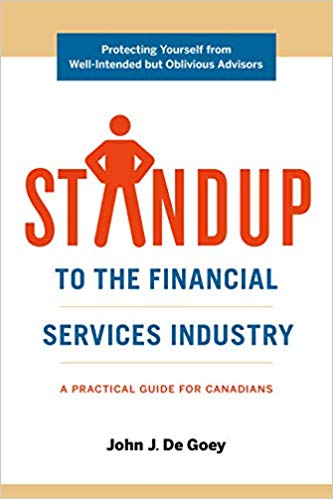 My latest MoneySense Retired Money column is a review of advisor John De Goey’s new book: STANDUP to the Financial Services Industry. Click on the highlighted headline for the full column: Fight for your right to low fees.
My latest MoneySense Retired Money column is a review of advisor John De Goey’s new book: STANDUP to the Financial Services Industry. Click on the highlighted headline for the full column: Fight for your right to low fees.
Obviously a retrofitted acronym, STANDUP stands for Scientific Testing and Necessary Disintermediation Underpin Professionalism. STANDUP was an undercurrent in the four editions of De Goey’s previous book, The Professional Financial Advisor. There he argued that while most advisors hold themselves out to be professionals like doctors, lawyers or accountants, the primary function of most advisors is “to sell products.” STANDUP Advisors are the good guys and gals: the “self-aware and knowledgeable advisors” his new book aims to help readers find. His personal website is www.STANDUP.today.
Bad advice they believe is good
Right from the get-go, De Goey is pretty harsh on many members of his profession. Much of what advisors believe is “demonstrably wrong” he declares right on page 2 of his introduction: “People who give advice for a living routinely give bad advice while honestly believing that the advice they are giving is, in fact, good. That’s a huge problem.”
He puts much of the blame on the managers of retail advisors, chiefly the senior members of Canadian mutual fund companies. He hauls out the old Upton Sinclair quote to illustrate the gap between doing what’s good for investors and what’s profitable for the financial industry itself: “It is difficult to get a man to understand something when his salary depends upon his not understanding it.”
As anyone who has read his articles or broadcasting pronouncements will know, De Goey has long been a critic of “embedded compensation,” chiefly the trailer commissions paid out by mutual fund companies to advisors who sell their funds.
Fees especially important for retirees

Asked what part of his new book is most relevant to retirees and would-be retirees who would read this column, De Goey points to two graphs on pages 74 and 75. These show that in the Wealth Accumulation phase, paying lower fees results in meeting your retirement goals 2.5 years sooner; and that in the Decumulation phase, lower fees results in savings lasting at least ten extra years.
Billed as a “practical guide,” the second half of the book lists dozens of questions retail investors should ask their current or prospective new advisors, meant to identify their STANDUP qualities or lack of same. Designed to help “ensure Advisor accountability” it lists how to spot the major misguided beliefs, and how to decode “Advisor Doublespeak” about why costs do or do not matter.
Advisor, heal thyself!
While the first six chapters are focused on consumer/investors, the last one addresses advisors directly, with seven steps to correcting the errors of their ways. (“Advisor, heal thyself!” is the admonition.) Here the author urges miscreant advisors to admit they’ve been hoodwinked by the financial industry, to believe the profession can be restored by transparency, to base future recommendations on empirical evidence, to conduct a moral inventory of past conduct and wrong inflicted on clients, make amends with those clients and to engage in continuous self-improvement by staying current as new evidence arises.

